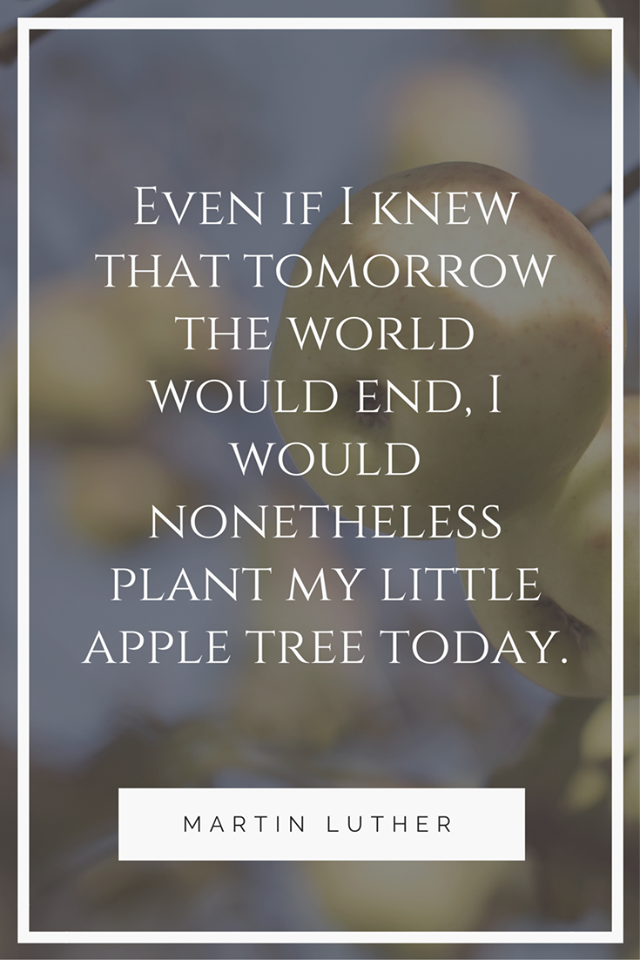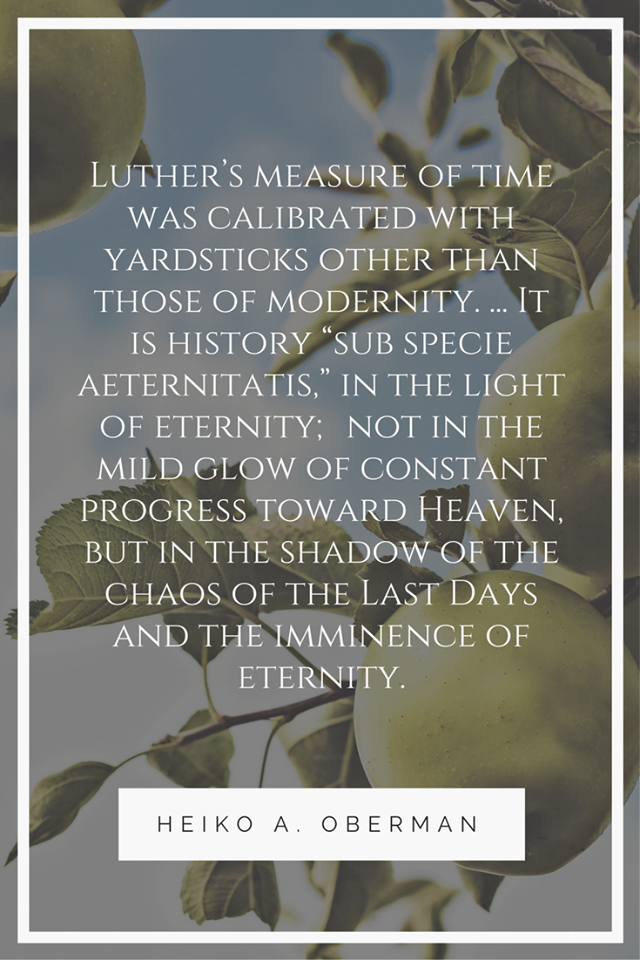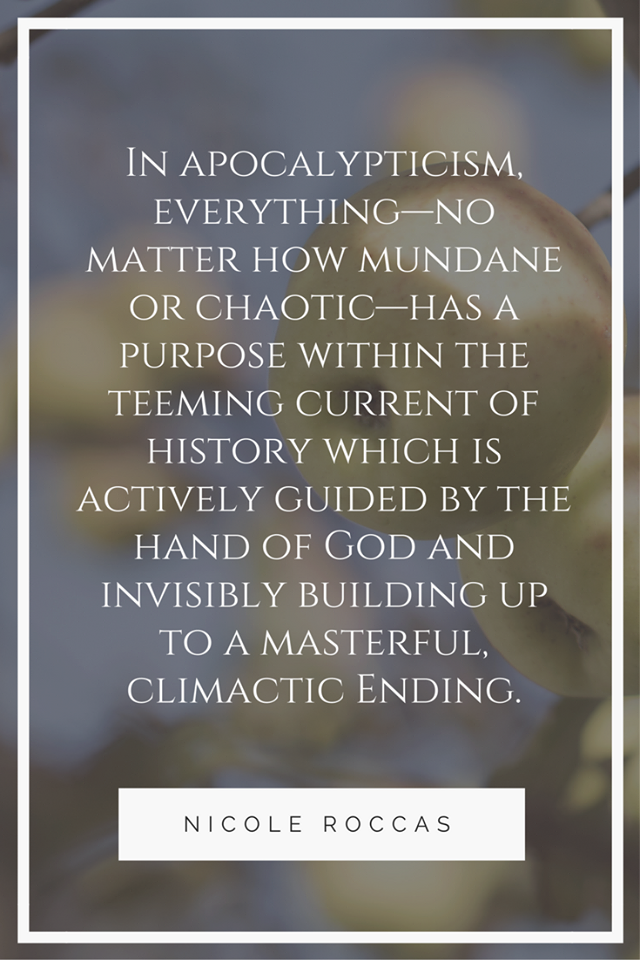
Editor’s Note: This article is part of an October 2017 series of posts on the Reformation and Protestantism written by O&H authors and guest writers marking the 500th anniversary of the nailing of Martin Luther’s 95 theses to the church door at Wittenberg on October 31, 1517. Articles are written by Orthodox Christians and discuss not just the Reformation as a historical event but also the spiritual heritage that descended from it.
When I moved eleven hours away from my hometown to begin graduate school, I left behind a subculture that at the time felt increasingly foreign. The Christianity I was raised in had many commendable qualities; it was sincere, it was faith-driven, it was in love with the Scriptures. But there was also baggage.
I suppose it is in the nature of faith that eventually, you have to take a critical look at the beliefs you inherit from those who came before you. And among the things I personally had to reconcile was the intense, unflagging centrality of the End Times in the churches I attended in my childhood. Growing up, the Last Days—embodied in the Rapture—was perpetually around the corner. My parents and many of my friends’ parents actively discerned the signs of the times in the nightly news, the cataclysms of nature, the decay of culture, and the dreams of sleep.
This level of apocalyptic expectation affected my life in countless ways. In high school, for example, I was offered a scholarship to study abroad for a semester. However, the powers that be deemed this too risky— the Rapture was expected to occur that summer, and if it did, global infrastructure would naturally come to a grinding halt. Among other things, my parents couldn’t face the thought of being separated from their only daughter during such a momentous event, so I stayed and watched my best friend go on the exchange instead. (Ironically, 9/11 occurred just after I would have left to go abroad—perhaps my parents’ inklings of the future were not too far off, after all.)
By the time I began my MA in German Studies (to be followed by a PhD in European History), the apocalyptic worldview that pervaded my growing-up years had grown thin. The longer the Lord tarried in His return, the more I began to recognize the darker side of apocalyptic belief—the seeming chaos of it all, the inability (or lack of desire) to plan for the future, to budget, to create stable systems of Church governance and structure, to engage the world outside strict us-and-them categories.
Relocating for graduate school was my ticket out of that. As soon as I settled into my new city, I found myself gravitating toward historical, liturgical expressions of Christianity that seemed to draw on something deeper and older and more constant than the pseudo-prophetic currents of my youth.
In particular, I was drawn to Luther. His world fascinated me. The Reformation, or “early modern,” period (ca. 1450–1700), signified the collision of medieval and modern civilizations.
On the one hand, certain hallmarks of the medieval worldview persisted, albeit in varying degrees—widespread belief in astrology, for example, as well as the adherence to ritual, folklore, humoral medicine, and an Aristotelian, geocentric cosmology.
On the other hand, the Reformation was accompanied by new intellectual and cultural developments that forced people to reconsider the way the world worked. It was the age of the “paradigm shift,” to borrow a phrase from the late and great philosopher Joseph Kuhn. From the religious reformations of the sixteenth century (the Catholic Church experienced a reformation, too), to the Copernican and scientific revolution(s) of the seventeenth, the age of exploration, the “Little Ice Age” (a period of global cooling that affected crops and food supply in certain parts of Europe), and the sundry other transformations that hit society during this period—the world was changing, and according to some, it was changing quickly and drastically.
Many of these shifts were accelerated by the invention of the printing press in 1450, which forever altered the way information was transmitted and understood.
As fascinating as all of this was, most of my colleagues wouldn’t touch this period with a ten-foot pole. They preferred the familiar contours of modernity or the fantastical elements of medieval epics. For them, I think, early modernity was too outside the box, too unstable—like subatomic particles about to blow up. For me, though, it all felt strangely and comfortingly familiar—I couldn’t put my finger on it, but studying that period was one, prolonged bout of déjà vu.
And I dove in. I immersed myself in the great German literati of the era. I was particularly fascinated by the way religious thinkers made sense of the shifting sands around them in the wake of the Reformation.
To finish my MA, I was required to spend a full year writing a substantial research thesis. I chose to write mine on Paul Gerhardt, the most prolific Lutheran hymnist of the seventeenth century.
But to reckon with Gerhardt, I first had to reckon with Luther. And it was in the course of that research I stumbled upon a facet of the early modern worldview I hadn’t yet considered—its pervasive appetite for the apocalypse. I first encountered this while reading Luther: Man between God and Devil, a ground-breaking historiography by Heiko A. Oberman, the preeminent Reformation scholar of the twentieth century (and to whom I have jokingly referred as my “Doktorgroẞvater,” or doctoral grandfather, since he was the professor who advised my own doctoral advisor).

Man between God and Devil was first published in German in 1982, and it changed the way scholars viewed Luther. No longer was the great reformer (simply) the enlightened forerunner of modernity, nor the engineer of a more rational, literate form of religion. He was also a product of his time and place in history, and like other folks in that time and place, he waited in perennial and unabashed expectation of the Last Days:
Luther’s measure of time was calibrated with yardsticks other than those of modernity and enlightenment, progress and tolerance. Knowing that the renewal of the Church could be expected to come only from God and only at the end of time, he would have had no trouble enduring curbs on the Evangelical movement. […]
To understand Luther, we must read the history of his life from an unconventional perspective. It is history “sub specie aeternitatis,” in the light of eternity; not in the mild glow of constant progress toward Heaven, but in the shadow of the chaos of the Last Days and the imminence of eternity.1
As Oberman saw things, much of what fueled Luther’s tenacity was his unwavering belief that he was witnessing the Last Days, that Christ’s return was imminent, that the devil (not to mention the Antichrist/ Pope) was not only real but profoundly active, trying with all his might to deceive the faithful and obscure the Gospel in these few, latter days.
Go figure. I had finally wrestled myself free of the ominous apocalypticism of my growing up years only to take up shelter in a time period characterized by “a level of apocalyptic expectation that finds few parallels in Western History.”2
At the time, however, the irony was largely lost on me. It’s only in retrospect I can see that in my research and academic writing, I was not only trying to make sense of the past, but also my past—the jumbled apocalyptic soup back home that had never quite made sense to me. I was learning to unpack the spirituality I had acquired from my own forebears, learning to sort it all out and determine how to move forward as a person of faith in a meaningful, constructive way.
To be sure, Luther’s brand of apocalypticism was hardly without its own kind of darkness. His baldfaced comments about Jews and Turkish Muslims (and above all the Catholics) is enough to make modern readers squirm and/or blush and/or incite him for hate speech.
And then there was the potential for disillusionment. Although Luther never made any formal predictions as to when the world would end, he’d likely find little comfort knowing that we are approaching (not to mention celebrating) the 500th anniversary of his 95 Theses. I’m sure he was bewildered enough to find the world still around all the way back in 1546, when he lay on his deathbed—that’s how rapidly he had believed history was closing up shop.
Still, there was a thread of Luther’s thinking that helped me understand the apocalyptic fervor I had once experienced first hand. I came to realize, first of all, that apocalypticism is almost as old as humanity itself. It was, moreover, a quintessential aspect of the Judaism in which Christ Himself was raised.

Furthermore, belief in the End Times is not just a nutty tangent of faith but a fully intact worldview—that is, a cohesive and robust system of making sense of all reality. It provides a way of navigating the tension between the past and the future and legitimizes the struggles of the present moment. In apocalypticism, everything—no matter how mundane or chaotic—has a purpose in the teeming current of eschatological history, which is actively guided by the hand of God and invisibly building up to its masterful, climactic End.
I didn’t necessarily need this to be my worldview, but I was beginning to understand how and why others in my life could find so much comfort and legitimacy in it.
Luther’s apocalypticism, too, provided something that had been lacking in what I experienced of apocalypticism growing up. For him, the nearness of the End was hardly an excuse to fritter away time, twiddling one’s thumbs in despair until Christ returns. Instead, it was a penetrating call to action, to work and redeem and actively love one’s neighbor—not just in word, but especially in deed.
It was this vein of his thought that made apocalypticism existentially meaningful to me—it offered a way of being in this world I could respect and even find comfort in.
Reflecting this newfound regard for apocalypticism, my MA thesis opened with this paragraph:
In a cultural climate fraught with eschatological expectation, Martin Luther was famously claimed to have said: “Even if I knew that tomorrow the world would end, I would nonetheless plant my little apple tree today.”3 This quote reveals the existential duty inherent to a Lutheran, apocalyptic worldview. For Luther, it was important to continue carrying out the tasks of this life, even planting seeds for the future—come rain or shine, the Turks or the pope, or even the blood-colored moon of the Revelations of St. John. This endeavor mandates human activity in this earthly life, a refusal to view chaos and catastrophe as the determining forces governing life on earth. In a world quickly going asunder, one ought not to become passive but rather should remain active in the tasks of this world, planting seeds by living according to God’s word.4
I didn’t know it then, but I was making peace with the apocalypse, the shadow that had haunted my experience of faith and church for much of my life. I found in Luther’s approach to the End Times what I termed an “existential apocalypticism,” a mode of faith that was less caught up in pointing fingers at cosmic signs and political mayhem, and more interested in working to bring about goodness and grace in this world.
My flirtation with historical, liturgically oriented churches eventually led me to convert to Eastern Orthodoxy. In many ways, this is about the least apocalyptically zealous corner of Christianity you could possibly find. In other ways, however, Orthodoxy is perhaps the most “eschatological” of all the churches. In our liturgy, we “remember” and offer back to God all the saving events that have already come to pass: “the Cross, the Tomb, the Resurrection on the third day, and […] the Second and glorious Coming.” That is to say, in liturgical time, we look back on the Second Advent as though it has already occurred and come to fruition—because, sub specie aeternitatis (in the light of eternity, as Oberman phrased it), it has.
In other words, the salvation of this world has already happened, it is already a reality. Because of this, our vocation and imperative in this life is not too far removed from how Luther saw things. We are to perpetually engage in recovering the reality of our salvation from the veil of distraction and seeming meaninglessness. And we are to do this actively and tangibly, not only on behalf of ourselves but for the sake of our neighbor and our enemies and—through prayer—the entire world.
I would never have been able to appreciate this dimension of faith had I not first come to terms with apocalyptic belief. Luther was a pivotal stepping stone on that journey, and for that I’ll always be grateful for the great reformer.
- Oberman, Luther: Man Between God and Devil (New York: Image Books, 1989), 12.
- Robin Bruce Barnes, Prophecy and Gnosis: Apocalypticism in the Wake of the Lutheran Reformation (Stanford: Stanford University Press, 1988), 2.
- “Und wenn ich wüßte, daß morgen die Welt unterginge, so würde ich doch heute mein Apfelbäumchen pflanzen.”
- Nicole Lyon, “Between the Jammertal and the Freudensaal: the Existential Apocalypticism of Paul Gerhardt (1607-76)” (MA Thesis, University of Cincinnati, 2009), 3.




Thank you for this beautiful piece, it really made me think. Maybe how I feel about the notion of perpetually expecting the world to end is how Protestants feel about the Orthodox never knowing if we truly achieved salvation – one thinks to oneself “How can they live like that?” when in fact they do not necessarily live like that, no matter how alien and frightening that worldview seems.
Thanks Alexandra! As you mention, there are indeed a lot of disconnects when it comes to dialoguing with folks who see the world differently than we do. One of the things I’ve learned to value about my upbringing, despite some of the “baggage” I mention in this post, is how it’s helped me understand where people are coming from that other folks might label as “crazy.” It’s helpful to realize that most people act and believe in a way that seems fully rational and well founded to them, as strange as it may seem to others, and I think the key in dialoguing and understanding is trying to figure out and empathize with the broader pillars that keep their worldview intact. –Nicole Marie Roccas